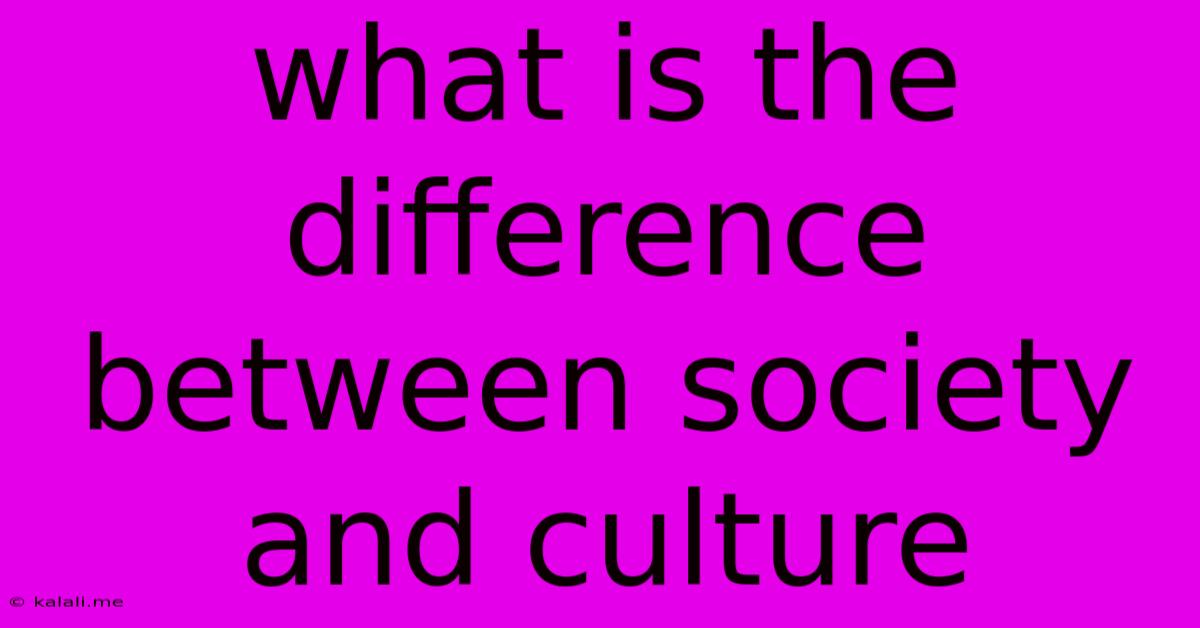What Is The Difference Between Society And Culture
Kalali
Jun 12, 2025 · 3 min read

Table of Contents
What's the Difference Between Society and Culture? A Deep Dive
Understanding the difference between society and culture is crucial for anyone studying sociology, anthropology, or simply wanting a deeper understanding of the human experience. While often used interchangeably, these two concepts are distinct yet deeply intertwined. This article will explore the nuances of each, highlighting their key differences and illustrating how they interact to shape our world.
Society refers to a group of individuals sharing a common geographical area, interacting with each other, and sharing a common culture. It's a structured system with established norms, institutions, and social hierarchies. Think of it as the physical and organizational framework within which culture operates. A society can be small, like a village, or vast, encompassing entire nations. Key aspects of society include:
- Social Structure: The established patterns of relationships between individuals and groups within a society. This includes family structures, political systems, economic organizations, and educational institutions.
- Social Institutions: Formalized structures that govern behavior and maintain order, such as government, religion, education, and the economy.
- Social Norms: The unwritten rules and expectations that guide behavior within a society. These norms vary widely across different societies.
- Social Interactions: The day-to-day interactions between individuals, shaping relationships and influencing social dynamics.
Culture, on the other hand, encompasses the shared beliefs, values, customs, behaviors, and artifacts that characterize a particular group or society. It's the intangible aspects that bind a society together, giving it a unique identity. Culture is learned, passed down through generations, and constantly evolving. Key characteristics of culture include:
- Beliefs: Shared ideas about the world, including religious beliefs, philosophical perspectives, and scientific understandings.
- Values: Shared principles that guide behavior and determine what is considered right or wrong, good or bad.
- Customs: Traditional practices and behaviors that are passed down through generations.
- Symbols: Objects, images, sounds, or actions that carry meaning within a culture. This could range from national flags to religious icons.
- Language: The primary means of communication and a critical component of cultural transmission.
The Interplay of Society and Culture:
Society provides the framework within which culture operates, while culture shapes the behavior and interactions within that society. They are inseparable and mutually constitutive. For example, a society's political system (a social institution) is heavily influenced by its cultural values regarding democracy, authority, or individual rights. Conversely, a society's cultural norms are reinforced and maintained through its social institutions, such as the education system or the legal system.
Illustrative Examples:
Imagine two societies: one with a strong emphasis on collectivism (valuing group harmony over individual achievement), and another prioritizing individualism (emphasizing personal goals and independence). These different cultural values will shape various aspects of their respective societies. The first might have close-knit family structures and community-based organizations, while the second might have a more competitive economic system and a stronger emphasis on individual rights.
In Conclusion:
While intertwined, society and culture are distinct concepts. Society refers to the structured organization of individuals within a geographical area, while culture represents the shared values, beliefs, and practices that bind them together. Understanding this distinction is crucial for comprehending the complexities of human social life and the diverse ways in which societies are organized and function. By analyzing the interplay between these two powerful forces, we gain a richer understanding of human behavior, social structures, and the evolution of civilizations.
Latest Posts
Latest Posts
-
Tsunamis May Be Generated By
Jun 13, 2025
-
Which Word Is An Antonym Of Obsolete
Jun 13, 2025
-
What Are The Factors Of 97
Jun 13, 2025
-
Which Of The Following Is A False Statement
Jun 13, 2025
-
Is Ifsc Code And Swift Code Same
Jun 13, 2025
Related Post
Thank you for visiting our website which covers about What Is The Difference Between Society And Culture . We hope the information provided has been useful to you. Feel free to contact us if you have any questions or need further assistance. See you next time and don't miss to bookmark.